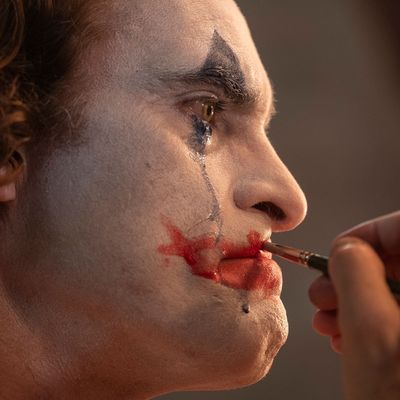
Remember how Jared Leto’s Joker had the word “damaged” tattooed on his forehead? Remember when Jack Nicholson’s Joker snickered “you can’t make an omelet … without breaking some eggs” and punctuated it by smashing Jerry Hall’s mask with his fist? Remember when Heath Ledger’s Joker gleefully made a pencil “disappear”? Yeah, well, nothing like that happens in Todd Phillips’s Joker.
Until the final act, that is, when Joaquin Phoenix’s take on the character fully emerges from the seriously screwed-up chrysalis of his everyday Arthur Fleck persona. Before that moment, there is nothing celebratory or calculated or even particularly absurd about his incremental acts of violence — something readers of the notorious leaked Joker script noted. “It’s so realistic!” went the excited refrain on Reddit threads dedicated to parsing the document, and while some aspects have changed from that draft of the screenplay, a grimy, grounded nature a million miles removed from capes or catwomen or vats of acid remains in the film that screened at Venice Film Festival. Unstable, unlovable, and antisocial as Fleck is, there is no preternatural evil inside of him, just frustrated longing and mental illness. It’s the world outside of Fleck’s mind that is malevolent — a world that, as Arthur says to his caseworker, “is getting worse.”
In the few short hours since Joker debuted — or should that be detonated — for audiences in Italy, approximately 1 billion words have been written about it, and about how Phoenix’s greasy, queasy, deeply uneasy performance stacks up against Jokers prior. The film is not only part of the extended Batman mythology, it is part of a comic-book genre of which Batman and its parent, DC Comics, are only subsets. But Joker doesn’t feel like any of the superhero movies that came before it. It drips with arthouse seriousness and unabashed provocation, packaged inside recognizable IP, meaning Joker will reach a much wider audience than a traditional indie title might.
It’s not just the R rating that sets Todd Phillips’s film apart. There have been R-rated comic-book films before — Blade, Kick-Ass, Deadpool — marked by excessive gore and sexual content and kids who use the C-word. Joker, on the other hand, possesses a murky morality that doesn’t fit with the good-evil binaries of usual superhero films. (In terms of violence, though, it earns that R instantly in a scene in which Arthur bludgeons a co-worker to death with his hands, a pair of scissors, and his squalid apartment’s skirting board.) The closest comparison in the genre is probably James Mangold’s R-rated Logan, an ode to a broken, aging Wolverine forced to go rogue, that similarly packed in references to classic cinema. But the crucial difference is that Wolverine, however grudgingly, is a hero. Arthur is absolutely not.
Joker borrows texture and tone from other bygone films, sucking movie history into its superhero form. It refers directly to Taxi Driver (Arthur mimes blowing out his brains with a finger gun) and The King of Comedy (Arthur wants to be a comedian and is obsessed with a talk-show host played by Robert De Niro). Those are difficult, provocative, grown-up films. In 2019, Joker is harkening back to the movies of the ’70s, the era of the anti-hero, when radical ideas, maverick talents, and distinctly countercultural sensibilities briefly ruled Hollywood, before blockbuster culture steamrolled over them.
And now the blockbuster is an all-conquering, multiplex-colonizing beast, and its most successful model has been the comic-book movie, bringing the story of Joker’s development looping back on itself. As convincing and effective as Joker is, that alone doesn’t justify its existence. Do we really need a comic-book supervillain remade as Travis Bickle, when we already have Travis Bickle? Are we so cornfed on superhero movies that we can only understand the tragic irony of a cautionary tale like The King of Comedy when it’s reworked to include a bit where Bruce Wayne’s parents get killed for the gazillionth time in a hail of gunfire and scattered pearls? Critics are already wondering whether or not superhero movies will ever be the same post-Joker, but perhaps we should be worrying about the rest of the cinema world, too.

